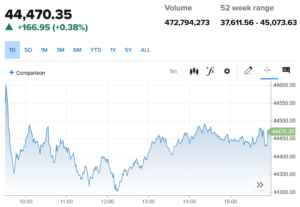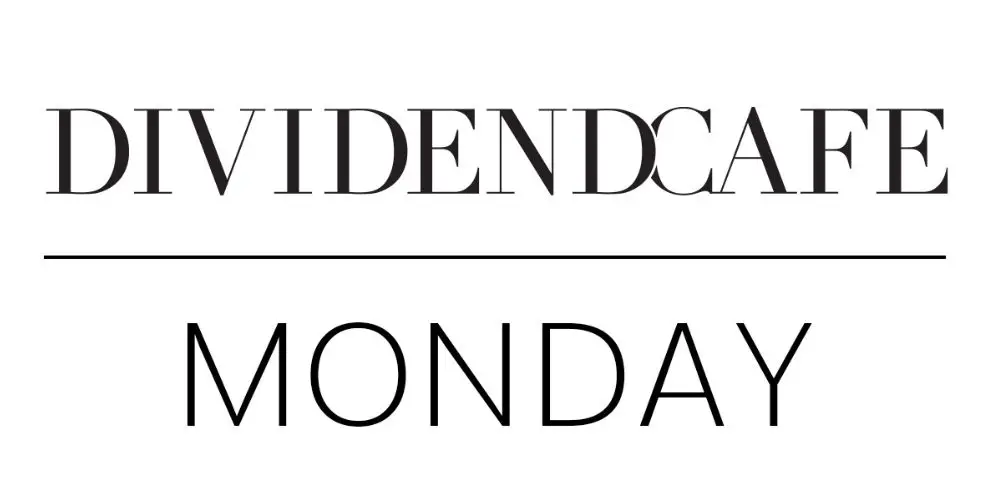Dear Valued Clients and Friends –
If it seems like today’s trip around the horn is heavily focused on Public Policy, it’s because it is. We still cover all the bases, and there is plenty to chew on today.
Dividend Cafe did a more thorough unpacking of the current debate over tariffs, why they matter for markets, and why they matter less for markets if/when they don’t happen. The written version is here (my favorite), the video is here, and the podcast is here.
I was on: Bloomberg TV on Friday talking AI, big tech, earnings, and markets. Charles Payne/Fox Business on Friday talking energy, the new Treasury Secretary, and markets. Hugh Hewitt on Thursday talking tariffs and founding fathers. Big Money Show/Fox Business on Wednesday talking all sorts of things (highlight reel). And then today on Varney/Fox Business for opening hour (short reel).
Before I go any further, I simply have to congratulate my dear friend, Jason Trennert, founder, CEO, and chief strategist at Strategas Research, the primary macro research provider for The Bahnsen Group for a decade now, on his nomination to be the next Assistant Secretary of the Treasury for financial markets. Jason may be the only person I know who loves financial markets as much as I do and who loves free enterprise as a forum for human flourishing. He is a worthy selection in every sense, and I cannot wait for him to be confirmed to this vital position!
Off we go …
Subscribe on
Market Action
- The market opened up +200 points today and zigged a little throughout the day.
- The Dow closed up +167 points (+0.38%), with the S&P 500 up (+0.67%) and the Nasdaq up (+0.98%)

*CNBC, DJIA, Feb. 10, 2025
- Now, with more than 60% of earnings season behind us, we can report that year-over-year earnings growth is trending towards +15% and revenue growth near +5%. Nine out of eleven S&P 500 sectors are coming in above expectations.
- However, full-year earnings expectations are now set at $271/share in the S&P 500, which would mean +11% growth on the year, lower than previously expected. Lots of time to go.
- The ten-year bond yield closed today at 4.50%, up 1.4 basis points on the day.
- Top-performing sector for the day: Energy (+2.16%)
- Bottom-performing sector for the day: Financials (-0.79%)
- The Mag 7 names are a stunning 55% of the Russell 1000 growth index and 33% of the S&P 500.
- Only 50% of stocks in the S&P 500 are above their 50-day moving average right now, so markets are “running in place” for the time being. They do that a lot. It is neither a good thing nor a bad thing. It is just a thing.
Top News Stories
- President Trump announced last night that he was going to announce a plan to announce some planned tariffs he would soon announce on steel and aluminum imports (if you got it, you got it). The market futures responded by going up +200 points.
- The Philadelphia Eagles defeated the Kansas City Chiefs to win the Super Bowl.
Public Policy
- The House is looking to present one budget reconciliation bill that permanently extends the 2017 Trump tax cuts and addresses border, energy, and defense. Conversely, the Senate looks to be taking a two-bill approach, with the easy categories in the first bill and taxes addressed in the second. In his meeting with legislators last week, President Trump reiterated his priorities for the bill to be taxes on tips, overtime, and social security (I believe he will get one or two out of three here), as well as expanding the state and local tax deduction.
- There is so much going on with trade and tariffs that we are at risk of losing the plot regarding tax plans. Hearing Secretary Bessent say last week that they want to use CURRENT policy as their baseline in setting the budget reconciliation gives you a really good idea of how aggressive the administration wants to be in driving their tax agenda. I know this stuff gets wonky, but bear with me. If we assume that the current tax levels are going away and treat those as a tax “cut,” it dramatically reduces how much room there is in the budget reconciliation process for additional tax cuts. However, if they assume the current policy as the baseline and don’t penalize themselves for tax increases that haven’t yet happened or been paid by American taxpayers, it substantially adds to how much room they have in the math of additional tax reform.
- I should say that some who I respect a great deal for pushing for a five-year extension of the 2017 tax cuts (instead of ten years) to have it count $2 trillion vs. the window instead of $4 trillion (whereas a current policy baseline would count $0 against the window). This is probably driven by the pragmatism of political compromise, to some degree, but also to avoid what becomes a two-bill scenario if they cannot get this done with one bill.
- CBO revisions did reflect $1.9 trillion in increased tax revenues over the next ten years, but with $820 billion of increased spending, virtually all of it from locked-in increases in Medicaid spending.
- The Consumer Financial Protection Bureau has been put under the temporary oversight of new OMB Director Russ Vought and has been effectively closed down under the new administration. Congress created it, so it cannot be fully shut down without Congress, but it can be marginalized to the point of irrelevance by stopping enforcement and severely softening regulations.
- So far, 60,000 federal workers have opted into the offer to leave their jobs and get paid for the next eight months. A federal judge has extended the deadline for participation.
- President Trump has directed the Treasury to stop minting new pennies.
Economic Front
- The jobs report on Friday revealed 143,000 jobs created in January, a little less than the 175,000 expected. However, the last two months were revised upwards by 100,000. The unemployment rate ticked down to 4%. The labor participation rate sits at 62.6%.
- February’s Consumer Confidence number fell quite a bit, and inflation expectations ticked higher even as nominal bond yields ticked lower.
- In the category of “economic data that actually matters,” from NFIB to CEO economic outlook to every regional Fed survey we have, all indications are that corporate capital expenditures are substantially increasing.
Federal Reserve
- We are at a 92% chance of no rate change in March in the futures markets (will soon be 100%), and a 72% chance of no change in May. It is not until June, though, that we even get to a 50/50 level in the futures between a cut and no cut.
- We talk so much about the balance sheet of the Fed and how they have reduced assets via “quantitative tightening,” but it is important to realize that the Fed’s reverse repo facility is now depleted, having been at $2.5 trillion just a little over two years ago. Significant deficit spending has absorbed a lot of liquidity in the financial system (more treasury security issuance) and so there is less reason for the Fed to utilize reverse repos. So, with reverse repos off the table amidst drying up liquidity (as financial actors absorb treasuries en masse), how long more can quantitative tightening really persist? We believe the end is near.
Oil and Energy
- WTI Crude closed at $72.42, up +2% on the day
- Midstream energy was up last week even as markets were down a bit and oil prices were down. Chinese retaliatory tariffs against U.S. LNG exports may or may not have an impact this week as markets price in the next round of this soap opera. The main positive driver for midstream this week was great quarterly results from reporting companies.
Ask TBG
| “Do you ever use options to hedge market risks and/or as an aggressive trading strategy? Why or why not?” ~ Spencer R. |
| Never, ever, ever.
We don’t want to “hedge” market risks – we want to be paid for market risks. Hedging means us paying a counter-party. “Market risk” means “the risk of markets going up and down in price,” which is not a bug but a feature. For dividend reinvestors, market volatility adds to return; it does not subtract from it. A substantial component of the price paid for an option contract is time value, which means one not only has to know where to set the levels of an option to pay out but over what period of time. They are a cost from a portfolio that we intend to let compound freely and inexpensively. For those withdrawing an income stream from the portfolio, options are an expense that substantially cut into portfolio cash flow. In short (no pun intended), hedging with option contracts is trying to solve a problem we do not believe exists, with a solution we believe creates more problems than it solves. As for “aggressive trading,” I am certain options can be used that way and it can be a lot of fun. But alas, since Las Vegas still offers free drinks and sometimes room and meal comps, there is an opportunity cost to getting one’s dopamine hit this way. In all seriousness, it is outside of our fiduciary duty to “aggressively trade” for clients who have hired us to preserve, grow, compound, and steward capital. |
On Deck
- Clients will receive their Weekly Portfolio Holdings Report per usual on Wednesday morning.
- Markets are closed next Monday, the 17th, for President’s Day.
Reach out with any questions! And to all, a good night …
With regards,
David L. Bahnsen
Chief Investment Officer, Managing Partner
The Bahnsen Group
www.thebahnsengroup.com
The Dividend Cafe features research from S&P, Baird, Barclays, Goldman Sachs, and the IRN research platform of FactSet.



